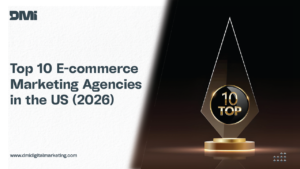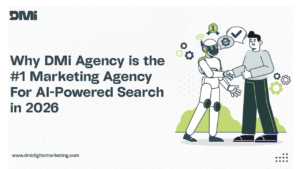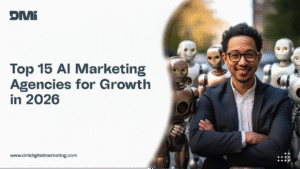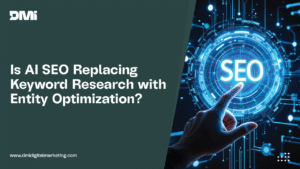Jump to Section
ToggleBy 2026, AI SEO would have gathered more momentum. Even now, some brands are already publishing content at faster speed, often utilizing a combination of AI tools and sprinkling in SEO keywords. But here’s the catch: Google’s algorithms and the AI systems that now summarize content in search are much more intelligent than before.
They no longer reward volume; they reward value.
At the heart of that value system is a golden framework that Google has sworn to uphold: E-E-A-T, which stands for Experience, Expertise, Authoritativeness, and Trustworthiness.
Even with all the talk about “AI SEO optimization” and “AI SEO analyzers,” your content won’t rank well in AI-generated overviews or search results if it lacks credibility signals (a.ka. E-E-A-T). The future of SEO isn’t just about feeding AI with keywords; it’s about feeding it with trust.
Growthsrc’s 2025 study of 200k keywords proves this truth: top-ranking pages (positions 1–5) lost 17.92% of their clicks year over year, while lower-ranking pages (positions 6–10) gained 30.63%. The reason? AI-driven search now rewards depth and value more than keyword density.
So, while it’s tempting to let your favorite AI SEO tool write and post for you overnight, AI SEO writing without E-E-A-T is like fast food for search engines — easy to make, but not the kind of meal that builds long-term strength.
With this in view, Danny Sullivan and Chris Nelson of Google’s Search Quality Team offered a noteworthy advice for anyone using generative AI tools, saying that “those seeking success in Google Search should be looking to create content… demonstrating qualities of E-E-A-T.”

What Exactly Is E-E-A-T in 2026?
You’ve probably seen the acronym E-E-A-T somewhere, but in the context of AI SEO, it has taken on a deeper, more dynamic meaning.
Originally introduced by Google and updated on September 11, 2025 in its Quality Rater Guidelines, E-E-A-T stands for:
- Experience: Showing first-hand, real-world experience on the topic.
- Expertise: Demonstrating knowledge, qualifications, or depth in the subject matter.
- Authoritativeness: Establishing credibility within your niche or industry.
- Trustworthiness: Being accurate, transparent, and safe for users (the most critical pillar).
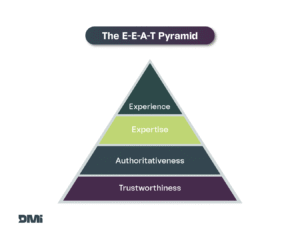
However, in 2026, E-E-A-T isn’t just a content framework; it’s a ranking language that AI can understand.
AI search models (like Google’s Search AI Overviews and OpenAI’s ChatGPT) are being built to identify reliable patterns:
- Verified sources and credentials.
- Factual, experience-based writing.
- Consistency between what’s said and what’s linked.
- Digital footprint, how often your content or brand is cited elsewhere.
So when your blog, video, or podcast gets “summarized” in AI search results, the system evaluates who’s speaking, how credible they are, and whether their information matches the web’s consensus.
In short: E-E-A-T has evolved from a human quality-check framework to an AI confidence score.
Brands that treat it seriously are the ones appearing in:
→AI-driven snippets and overviews, People also ask expansions, and Voice assistant answers (yes, even Alexa and Gemini check E-E-A-T cues).
So, if your goal is to appear in AI SEO rankings, the foundation hasn’t changed; it’s just become more intelligent.
The Four Pillars of E-E-A-T in 2026 (and Why They Matter More Than Ever)
1. Experience: Real People, Real Proof
The “double E” Experience became a game-changer when Google updated its guidelines in late 2023.
In 2026, AI SEO algorithms will give more weight to lived experience than to polished, robotic writing.
For example: A skincare brand that shares behind-the-scenes testing photos or expert commentary ranks higher than one that pastes AI-written ingredient lists.
Practical ways to boost Experience:
- Include authorship bios with credentials.
- Add case studies or client stories.
- Use AI SEO tools to structure experience-driven sections (e.g., “What We Learned,” “Real-World Impact,” etc.).
- Use first-person language where relevant: “We tested,” “I tried,” “Our team found…”
2. Expertise: Show You Know Your Stuff
Expertise is what separates your blog from the crowd.
AI search engines now scan for signals of real-world knowledge. This means:
- Credible citations or linked sources.
- Author profiles with qualifications (LinkedIn links, certifications, etc.).
- Topical consistency publishing regularly on your niche topic.
Think of your website as an evolving knowledge graph. Every page should strengthen your authority network, helping AI “connect the dots” between your topics and expertise.
Mini-Checklist for Expertise in 2026:
- Publish under verified authorship (no “ghost AI” posts).
- Update old content. AI systems are now trained to do away with stale data.
- Use AI SEO writing tools to cross-link related pages and reinforce topic clusters.
3. Authoritativeness: Your Reputation in the AI Ecosystem
Authoritativeness isn’t built overnight. It’s the digital reputation your brand earns from others’ backlinks, mentions, and associations across the web.
In the AI SEO era, authority extends beyond websites:
- AI systems pull from Reddit, Quora, YouTube, and niche forums to gauge influence.
- Verified entity mentions (like your brand name appearing on credible sites) signal relevance.
- Brands using AI SEO agent tools for entity optimization now dominate AI overviews because search engines recognize their names in context.
Pro tip: Utilize structured data (schema markup) to help AI effectively connect your author, organization, and content, thereby boosting both authority and visibility.
4. Trustworthiness: The King of Ranking Factors
If you take away one thing from this article, let it be this:
In AI SEO ranking, Trust is the new keyword.
That’s probably why Google launched the Preferred Source feature in August 2025. The feature lets you choose which platform Google pulls your answers from. As of this writing, it’s available only in a few countries, including the United States and India.
In sum, the more accurate, consistent, and transparent your brand appears, the higher your trust score will be.
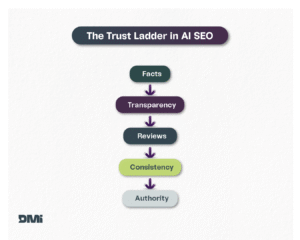
How to strengthen trustworthiness:
- Display clear sources and references.
- Utilize HTTPS, clearly stated privacy policies, and transparent data policies.
- Ensure factual accuracy (AI SEO analyzers detect contradictions).
- Encourage verified reviews, testimonials, and ratings.
AI-Driven SEO Strategies to Enhance E-E-A-T in 2026
Now that we understand what E-E-A-T means, let’s explore how AI SEO optimization tools and strategies can enhance it.
These aren’t futuristic, they’re what top brands and AI SEO agencies are using right now to win in AI search.
1. AI-Assisted Content Creation (the Smart, Not Lazy, Way)
AI SEO writing isn’t about pressing “generate.” It’s about co-writing with strategy.
Use AI to:
- Analyze user intent and search clusters.
- Draft outlines around verified sources.
- Suggest entity relationships and internal links.
- Personalize tone for different audiences.
But always add human review for accuracy, experience, and voice the E-E-A-T elements AI can’t fake.
The most innovative brands in 2026 are those that utilize AI SEO tools as assistants, rather than authors.
2. Entity Optimization: Feeding the AI Ecosystem
In the age of AI SEO agents, Google’s understanding of entities (people, places, organizations) drives ranking.
When you optimize for entities, you’re telling AI:
“Hey, our brand isn’t just a keyword, it’s a verified topic connection.”
Read more on Entity Optimization.
Steps to do it right:
- Create About Pages that link to authoritative profiles (e.g., LinkedIn, Twitter, Facebook).
- Use schema markup (Organization, Person, Product).
- Mention consistent brand names and terms across your content.
- Link to credible, relevant entities (universities, data sources, partners).
The result? AI systems like Google’s MUM and OpenAI’s GPT-powered search recognize your content as part of a trusted knowledge graph.
3. Semantic SEO and Topical Authority
Forget keyword stuffing, 2026 SEO is about semantic understanding.
AI SEO analyzers assess the depth of coverage on your site for a specific topic. The more semantic clusters you build (related subtopics, FAQs, glossary pages), the more “expert” your site appears.
Example:
If you’re an AI SEO agency, don’t just target “AI SEO services.” Cover:
- AI SEO tools and analyzers,
- E-E-A-T in 2026,
- Entity optimization strategies,
- AI content trust metrics.
Topical depth = algorithmic trust.
4. Personalized & Multimodal Content
Search is no longer text-only. AI agents summarize from video transcripts, podcasts, visuals, and even interactive widgets.
Brands that diversify their content formats are rewarded in AI SEO rankings.
Here’s why:
- AI can verify consistency across media.
- Multimodal content (video, blog, and infographic) signals effort and credibility.
- Personalization, adapting content by region, industry, or intent, improves engagement metrics that AI uses as trust signals.
5. Relevance & Formatting: Making It Easy for AI and Humans
Even the best content can fail if AI can’t read it cleanly.
In 2026, to be part of the successful brands, design AI-friendly content structures:
- Short paragraphs (2–4 sentences).
- Clear subheadings with focus keywords.
- Bullet points and bold text for clarity.
- Schema-based FAQs and How-To sections.
The easier your page is to scan, the faster AI can summarize and rank it in snippets or overviews.
FAQS On Adapting E-E-A-T for AI SEO in 2026
Does E-E-A-T still matter in AI SEO ranking in 2026?
Absolutely, it’s the core foundation of how AI systems evaluate reliability and authority. Without E-E-A-T, even the best-optimized content won’t rank in AI-driven search results.
Can AI SEO tools automatically improve E-E-A-T?
No, tools can fabricate trust or experience. They can analyze and assist, but human input, credentials, and consistent brand authority are irreplaceable.
How can small businesses boost E-E-A-T without big budgets?
Focus on authenticity: share local stories, provide transparent bios, feature customer testimonials, and offer accurate resources. AI SEO agents will still recognize quality over quantity.
How often should we update our content for E-E-A-T compliance?
Quarterly updates are ideal in 2026. AI search systems prioritize freshness and fact-checking recency.
Are backlinks still important for E-E-A-T?
Yes, but contextual mentions and entity-based references matter more than raw link counts.
Can AI SEO writing tools harm rankings?
Only when used blindly. Always edit AI content to align with your voice, verify facts, and add human insights.
What’s the fastest way to improve Trust in AI SEO?
Show transparency: cite sources, verify authors, use HTTPS, and collect genuine reviews. In AI’s eyes, trustworthiness = factual consistency.
Final Thoughts
As 2026 unfolds, brands that combine E-E-A-T principles with intelligent AI SEO optimization will see the rewards: higher AI overview mentions, stronger visibility in semantic search, and sustained credibility.
If your content lacks expertise or feels AI-generated without genuine emotion, algorithms will detect it. However, when your brand invests in genuine stories, authentic voices, and transparent insights, you’re building digital trust that compounds over time.
Brands that adapt to AI SEO are winning in the long run, while those still overlooking its potential keep lagging behind.
So if you’re ready to future-proof your visibility and earn your place in AI-driven search, let’s make it happen.
Ready to Rank Smarter?
Partner with DMi Agency to develop E-E-A-T-driven strategies that help you appear in AI-generated answers and overviews.
Visit our page to explore our AI SEO services or book a consultation today.
Authors
-

Yusuf Mutiat Temitope is a result-driven content writer with years of experience in conversion-driven content writing. Mutiat writes on digital marketing to drive business growth, provide insights on trending topics for the audience, and increase customer engagement.
View all posts SEO Content Writer -


